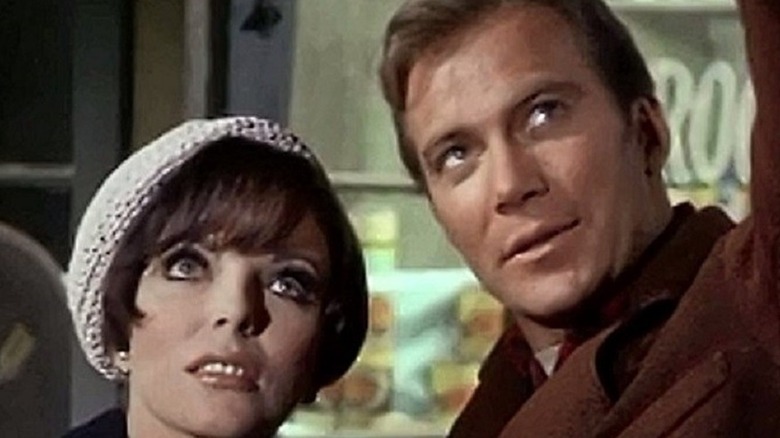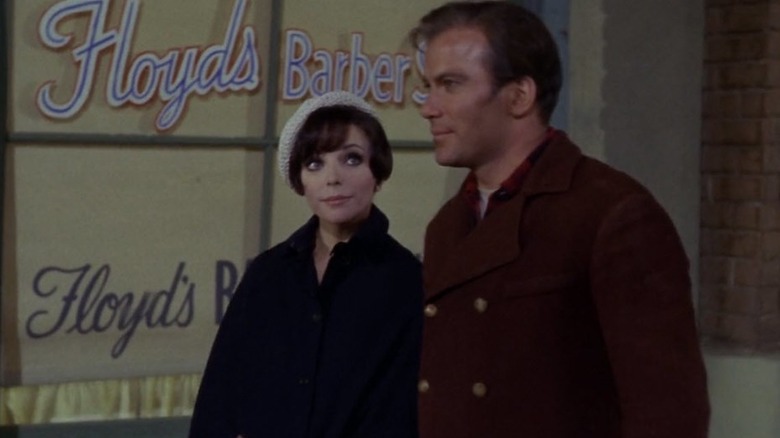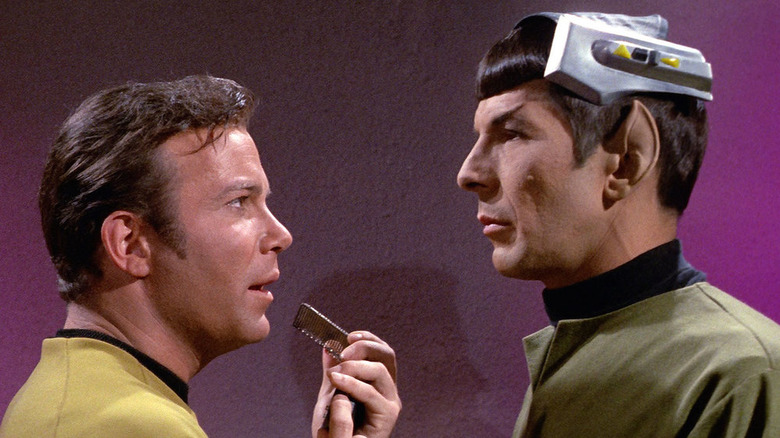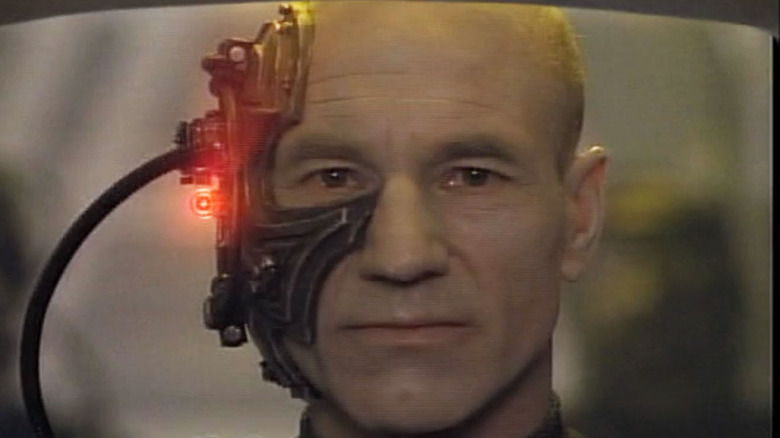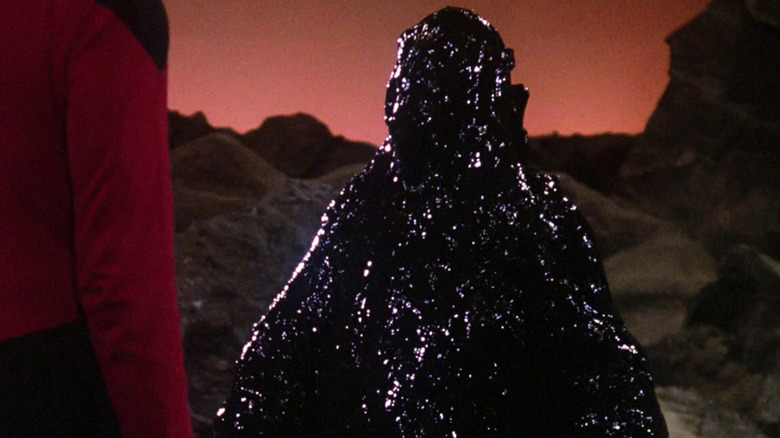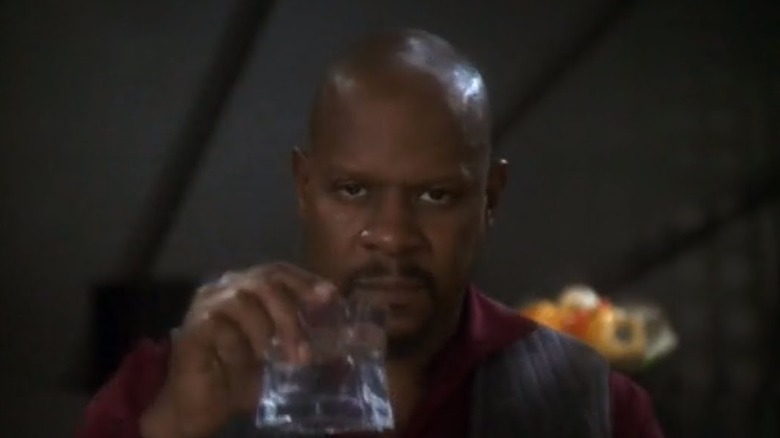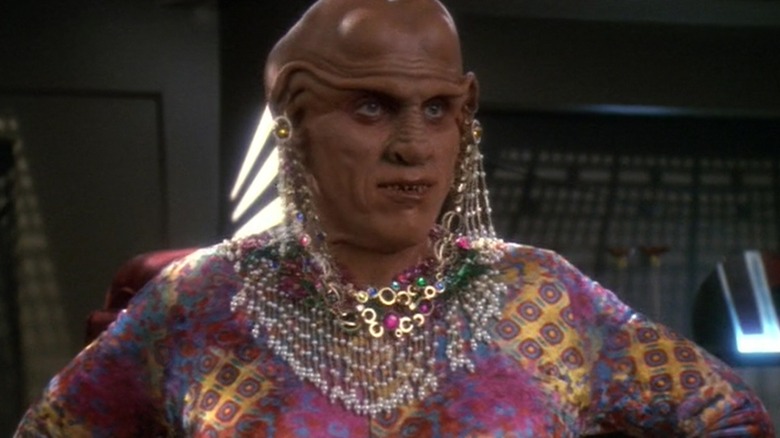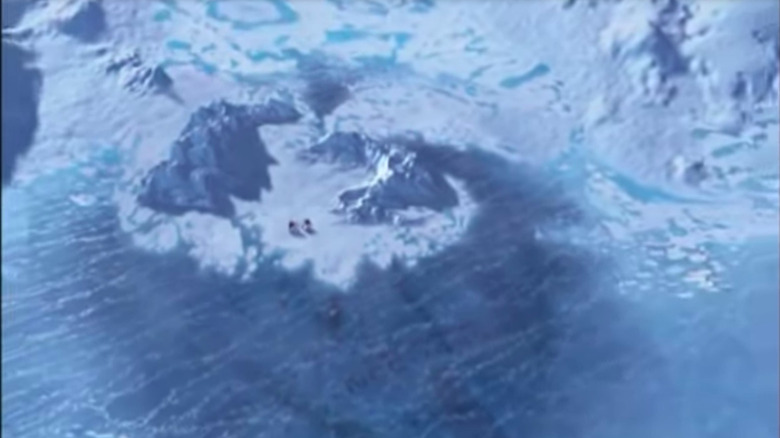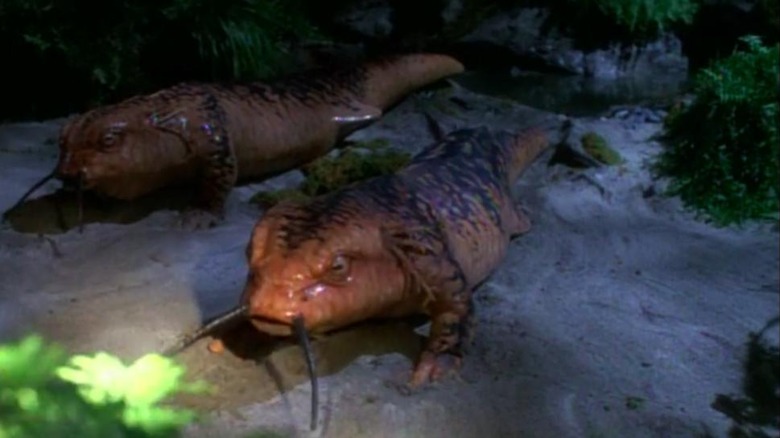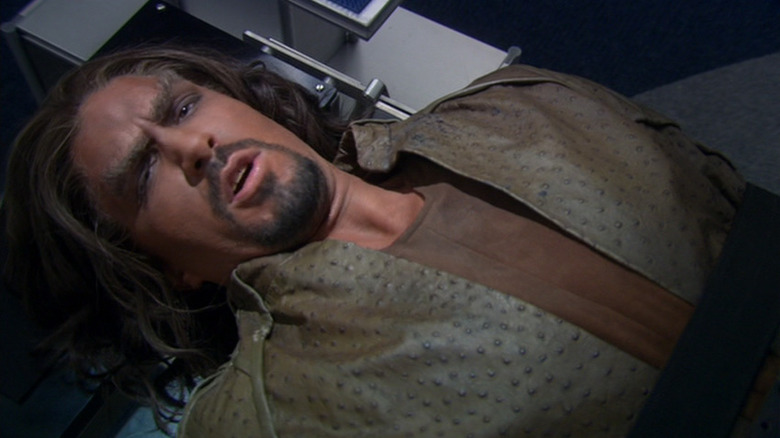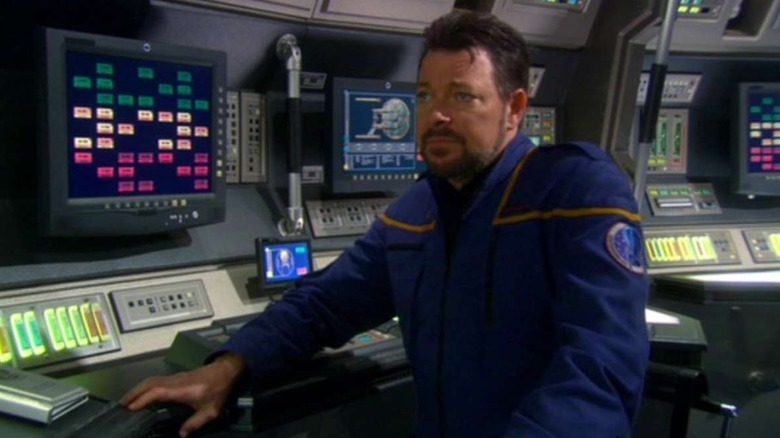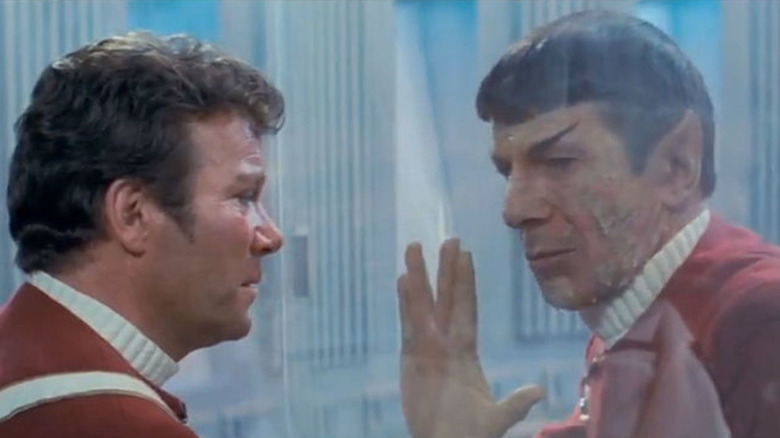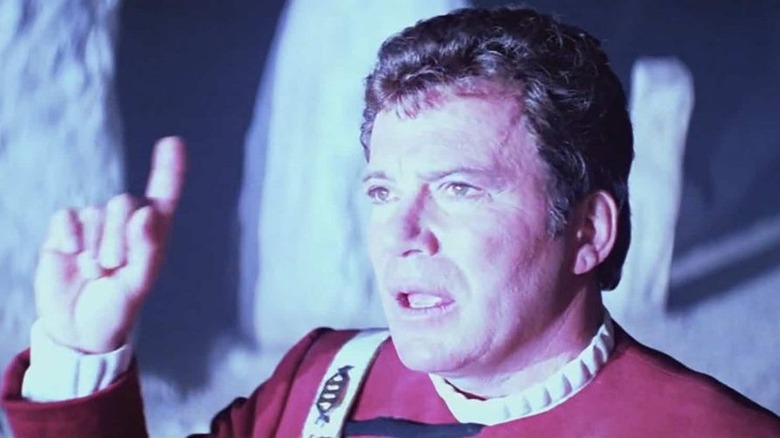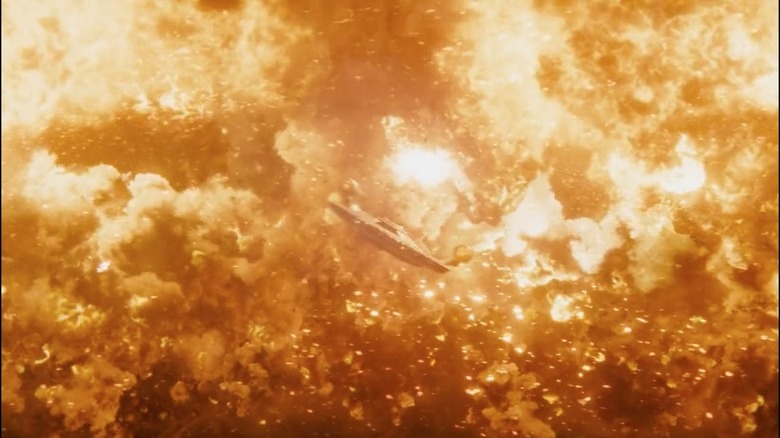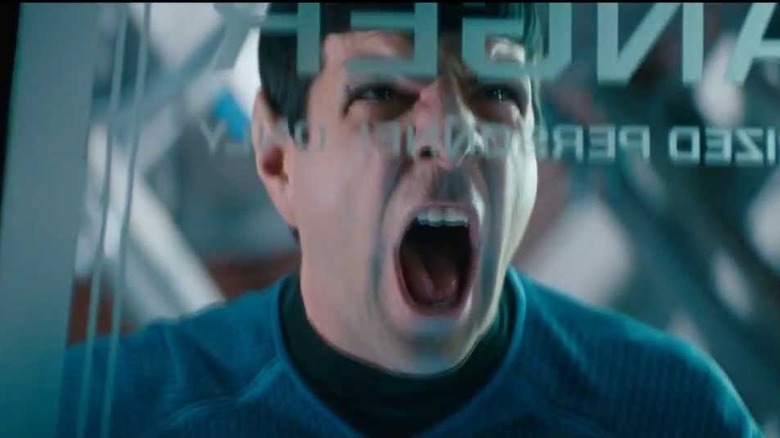Star Trek Moments That Stunned Audiences
Now north of a half century later, "Star Trek" has persisted far longer than anyone could have dreamed when the original series was greenlit in the mid '60s.
In a universe that has populated hundreds of hours of films and TV shows, there's nothing quite like it — although, to be fair, Disney's apparent desire to have "Star Wars" catch up with its longtime rival has so many shows and movies in development that the proliferation may soon be equalized. Amazingly, through sheer pop cultural osmosis, even someone who has never seen a "Trek" movie or series could probably tell you something about it.
To be sure, there have been a lot of iconic moments over the years in "Trek," some great and others not. But even those that fell flat have lived on in infamy, sometimes remembered more than many episodes. Looking back over a stunning amount of entertainment produced over the years, here's a remembrance of some of the franchise's greatest highs and most head-scratching lows.
Captain Kirk lets a woman die
"Star Trek" (or "Star Trek: The Original Series," as it has come to be known) may be seen as dated by some, but its stories and characters nonetheless have withstood the test of time.
All these years later, it still has arguably the best first season of any "Trek" show, an argument perhaps made most powerfully by the penultimate episode of that season, "The City on the Edge of Forever." In this episode, Dr. Leonard "Bones" McCoy (DeForest Kelley) travelled back in time and inadvertently changed the past, so Captain James Kirk (William Shatner) and Spock (Leonard Nimoy) go back themselves to stop him.
When Kirk falls in love with a woman in 1930s New York, he discovers that if Bones saves her life, the Nazis will take over the world. Kirk stops Bones from saving her, sacrificing the woman's life for the so-called greater good. "Star Trek" was at its best when dealing with such moral complexities, a virtue inherent in any great sci-fi, using extraordinary situations to make the viewer contemplate morality, duty, humanity. Kirk is no emotionless Vulcan like Spock, for sure — so here, doing the logical thing was as heartbreaking as it was necessary.
Spock loses his brain
The infamously bad third season of "Star Trek" couldn't have gotten off to a worse start than "Spock's Brain."
In this episode's absurd plot, someone has stolen Spock's brain and he only had 24 hours to find it or he would die. When Kirk confronted Luma (Sheila Leighton), the mysterious woman who has stolen it, she had no memory of doing so or even what Spock was missing, responding with the infamous line: "Brain and brain! What is brain?" On an episode of "Mad Men," Paul Kinsey (Michael Gladis) showed up with a supposedly "really bad" script of TOS that he was hoping to sell; without a doubt, he must have been trying to get it into Season 3.
In his memoir "I Am Spock," Leonard Nimoy admitted that he was embarrassed while filming the episode — and watching his performance, you can see moments of that truth shining through the artifice. "Trek" never recovered, soon receiving its cancellation as Season 3 put a once-great show out of its misery. Of course, the franchise would eventually be redeemed — but looking back now, it feels like "Spock's Brain" could have been the last nail in its coffin, if not for "Trek" fans who still saw a universe with so many great stories to tell.
Star Trek unleashes its first-ever cliffhanger
"Mr. Worf, fire." Any "Trek" fan can tell you what those immortal words mean.
When Captain Jean-Luc Picard (Patrick Stewart) was transformed into Locutus of Borg in "The Best of Both Worlds Part 1," Commander William Riker (Jonathan Frakes) gave the order to destroy the Borg ship, which would kill Picard before the crew had a chance to save him. Ending Season 3 with such a stunning moment generated enormous interest from fans, resulting in the Season 4 premiere having the show's best ratings in years.
Ultimately, the decision to fire did not destroy the ship and Picard was indeed rescued and turned back into a human; nevertheless, that moment stuck with fans. From that point on, "The Next Generation" would step out of the shadow of the original show and be taken seriously as a great series in its own right. The impact of the episode would be felt for many years to come, including in "Star Trek: First Contact," perhaps the most popular "TNG" film.
TNG pointlessly kills off Tasha Yar
Although "Star Trek" crews are never surprised when one of their own dies — hey, flying around the universe exploring strange planets is a dangerous job — they also never seem to figure out that it usually happens to one of the "red shirts."
As memorably parodied by Sam Rockwell in "Galaxy Quest," crew members in crimson typically have minimal lines, forgettable characteristics, and simply exist as fodder for drama to unfold, raising the stakes for the series stars.
"Skin of Evil" is a good example of this. It might not be the worst episode of TNG's (very rough) first season — which also includes the episode "Code of Honor" and its racist depiction of an alien species meant to resemble an African tribe — but the tar monster was too silly to take seriously, and not dangerous enough to dispatch someone as seemingly important as Denise Crosby's Lieutenant Natasha Yar, who met a shocking end at the monster's hands.
Sure, Crosby wanted to leave the show, but looking back all these years later, it still feels like a very lazy way to kill off a series regular. Crosby would eventually return in the episode titled "Yesterday's Enterprise," set in an alternate timeline where she hadn't perished. Guinan (Whoopi Goldberg) sensed that the Tasha from the correct timeline had died "an empty death. A death without purpose." "Yesterday's Enterprise" sought to correct that injustice, finally giving Tasha the sendoff she deserved.
Captain Benjamin Sisko can't fool a Romulan senator
While "TNG" had many episodes where the crew was desperate to avoid war, "Deep Space Nine" went all in with its multi-season arc of The Dominion War.
Series writers were determined to depict Captain Benjamin Sisko (Avery Brooks) as different from Kirk and Picard as possible, making him a widower who had lost his wife to the Borg, as well as someone who occasionally put aside his high-minded values for the greater good. "In the Pale Moonlight" (Season 6, Episode 19) had Sisko trying to trick the Romulans into joining forces with the Federation to fight against The Dominion.
When Sisko forged a recording of The Dominion planning an attack on Romulus, a disbelieving Romulan Senator Vreenak (Stephen McHattie) responded with the stunning line: "It's a fake." Sisko's meddling may have only made things worse, but when former spy Garak (Andrew Robinson) assassinated the senator and framed The Dominion, it led to the alliance that they wanted all along.
In the episode's final scene, Sisko was shown to be aware of all the bad things he had done, but still maintained it was worth the price. "So, I lied. I cheated. I bribed men to cover the crimes of other men. I am an accessory to murder. But the most damning thing of all ... I think I can live with it. And if I had to do it all over again, I would."
It might have been more consequential if the Romulans had eventually discovered the deception, but the fact that they never learned the truth made the episode even more unexpected.
Quark turns himself into a woman
While "DS9" presented many of the franchise's darkest turns and most complex quandaries, it also had some of the silliest comedy episodes.
"Profit and Lace" (Season 6, Episode 23) centers on Quark (Armin Shimerman), a member of the Ferengi race famed for their greed and misogyny. Quark's mother wants to change Ferengi society by wearing clothes and starting her own business, but she has a heart attack right before she can argue her case. Quark decides the only solution to this problem is to have a sex change operation, and make his mother's case for her.
It has always been a "Trek" calling card to comment on society's hot-button issues in thought-provoking ways, but this time the writers were addressing sexism in the most '90s way possible — meaning only surface-level, without much solicitation of actual female insight. Quark is supposed to be learning how to be more empathetic towards women, but when he is one, he just seems to be stereotypically obsessed with his appearance. Making matters more cringe-inducing, when Quark is almost sexually assaulted, it's played for laughs.
"DS9" is considered to be among the best of "Star Trek," but when a show has 26 episodes per season, sometimes it's hard to keep up the consistency.
Voyager buries itself under ice in
"Star Trek: Voyager" began with a great premise: Stranded in unfamiliar territory, the crew had an estimated 75-year journey to get home, so they must figure out how to significantly shorten that time, in order to not be lost forever.
Far too often, however, the series retreated to what was safe and comfortable rather than fully exploring the premise. One solid example of when the show set itself apart from "TNG," however, was in the excellent Season 5, Episode 6 installment entitled "Timeless." Giving new meaning to the term "cold open," the episode began with a shocking image of Voyager buried under ice, effectively grabbing hold of the viewers' attention.
Set in a future where their mission had failed, First Officer Chakotay (Robert Beltran) and Ensign Harry Kim (Garret Wang) had finally found the ship, believing they could prevent its destruction if they sent a message back into the past. In order to stop them, they had to get past future Geordi La Forge (LeVar Burton, also the episode's director), who was trying to stop them to preserve the timeline. Of course, fans expected that the ship would eventually be restored — but it still stands out as a stunning moment in one of the best episodes of the series.
Lieutenant Tom Paris and Captain Kathryn Janeway turn into salamanders
There was a kernel of an interesting idea in the "Threshold" (Season 2, Episode 15) episode of "Star Trek: Voyager." It was based on a theory that humans could continue to evolve, adapting to their environment to the point where they would become unrecognizable. Where this episode failed, however, was is in its baffling execution.
After traveling beyond Warp 10 in an effort to get the crew of Voyager home, Tom Paris (Robert Duncan McNeill) began mutating, but was nevertheless convinced it could work. In an effort to prove this, he stole a shuttle, kidnapped Captain Janeway (Kate Mulgrew) and took them to a remote planet.
Nothing could prepare viewers for the ensuing image, as the two of them become salamanders — and end up mating. In another bizarre twist, they wound up leaving their children behind.
Looking back in 2003, even writer Brannon Braga agreed with disappointed fans: "Out of a hundred and some episodes, you're gonna have some stinkers," he said. "Unfortunately, that was a royal, steaming stinker."
Enterprise explains why the Klingons' heads are different
Why do Klingons have smooth foreheads in the original "Star Trek" series, but ridged foreheads in every other iteration of the franchise? Well, because the '60s show had a low budget, obviously.
But "Trek" fans are not exactly known for taking things at face value, so for decades there was much speculation on the evolution (or de-evolution) of the species. In 2005, the prequel series "Enterprise" decided to come up with an in-universe explanation, offering a fun, two-part story told in the Season 4 episodes "Affliction" and "Divergence."
The drama begins when Doctor Phlox (John Billingsley) is kidnapped by Klingons because they need his help with a mysterious plague affecting their appearance. While Phlox was able to come up with a cure, audiences learned that the plague would continue to change their appearance for generations. The stunning moment, more than anything, was "Trek" acknowledging and addressing a perceived shortcoming in the eyes of the fans. Years before the MCU and Disney-era Star Wars made it commonplace, here was a franchise treating fans as collaborators to be acknowledged, rather than couch potatoes on the receiving end of a monologue.
Riker takes over Enterprise's series finale
You can't blame showrunner Manny Coto for the dreadful series finale of "Star Trek: Enterprise" entitled "These are the Voyages...," where writers Rick Berman and Brannon Braga reduced main characters to holodeck imitations in a misguided tribute to the long-running franchise.
Coto was instrumental in making Season 4 of "Enterprise" its best, but just as things were getting good, the series was cancelled due to low ratings. To wrap things up, "Voyages" gave us Commander Riker, creating a simulation with the "Enterprise" crew to help him with a difficult decision that he faced in the TNG episode "The Pegasus." This allowed "Enterprise" to flash forward six years after the previous episode, showing the crew having completed their mission — which would have been the eventual ending had the show had been able to realize its full run.
Actor Jonathan Frakes, however, was noticeably older in 2005 than he was in "The Next Generation," which was a huge distraction. In another head-scratcher, the episode set up a big speech from Captain Jonathan Archer (Scott Bakula), but Riker left before he gave it. All in, "Voyages" may have been well intended, but the results were insulting.
Spock sacrifices himself in The Wrath of Khan
"Star Trek: The Motion Picture" disappointed many in 1979, featuring contemplative pacing and trippy visuals more in line with Stanley Kubrick's "2001: A Space Odyssey" than George Lucas's "Star Wars." As a result, the 1982 sequel course corrected with a drastic overhaul that called back to the original series and resulted in "Star Trek II: The Wrath of Khan," which many "Trek" fans consider to be one of the highest points in the franchise's decades-spanning history.
Reprising his role of Khan Noonien Singh from the episode "Space Seed," Ricardo Montalbán provided a memorable villainous turn. The drama was capped by the heartbreaking death of Spock, in a key moment that tugged at the heartstrings of those who treasured the Spock/Kirk friendship, as the Vulcan sacrificed himself for the greater good, simply as a matter of pure logic.
At the funeral, Kirk gave a heartfelt goodbye: "Of my friend, I can only say this. Of all the souls I have encountered in my travels, his was the most human." Of course, the next film, 1984's "Star Trek III: The Search for Spock" would undo the sacrifice, but it's a testament to this stunning moment that its fallout provided enough heartfelt fodder to inspire an entire follow-up film on its own.
Kirk confronts God
There's a reason why the even numbered "Star Trek" films have a better reputation than the odd numbered ones. Fans can argue the merits of the first and third films, even if they don't quite measure up to the second and fourth films — but almost no one can defend "Star Trek V: The Final Frontier."
Burdened by a slow plot, cheap special effects, and broad humor, 1989's "Frontier" is consistently ranked among the worst "Star Trek" films. The plot was centered on Spock's half brother Sybok (Laurence Luckinbill), on a mission to find God; using the Vulcan mind meld, Sybok brainwashed as many people as he could, commandeering a starship to locate Him. When they finally do meet the divine one, they discover He needs the Enterprise to further some goals, prompting Kirk to ask, "What does God need with a starship?"
The line is ridiculous to the point where it has been endlessly memed — but in context, it does make sense. Kirk is casting suspicion upon the so-called God's true identity, and asking a question that the audience likely shares. Of course, no matter where you stand on this particular moment, the movie as a whole is as rickety and filled with holes as the Enterprise itself after an intense space battle.
Beyond rocks classic Beastie Boys
As the trailer for "Star Trek: Beyond" premiered, fans were shocked when it looked like director Justin Lin was going to make "Fast and Furious in Space" several years before he actually would take "Fast and Furious" into space.
The use of The Beastie Boys' "Sabotage" was stunning, because of how out of place it felt. Of course, the juxtaposition of futuristic space travel and late-20th-century rap-rock also referenced a similarly controversial music choice JJ Abrams had made for his 2009 "Star Trek" film. Taken together, these stings led to fan theories that the Beastie Boys not only existed in the "Trek" universe, but were some sort of gods.
Looking back now, it was rather ingenious that the films found a creative way to use the song without feeling like "A Knight's Tale." The film offers plenty of technobabble to justify it, but basically the crew has figured out that the best way to defeat a swarm of attackers is to play something with high frequency — so why not the song that Kirk listened to in the 2009 reboot? The film feels like a classic episode with some blockbuster action added in, as opposed to the previous films, which felt like blockbusters grafted onto a classic series. Fans shouldn't have been so quick to judge what it would be like based on a trailer, but the low expectations wound up working to the advantage of "Beyond."
Spock gives into anger
Why couldn't Benedict Cumberbatch's John Harrison have just been an entirely new villain? The franchise known for "boldly going" could have gone somewhere new, rather than simply dredging up an old, familiar character another actor had already claimed so definitively.
Not only that, but as JJ Abrams repeatedly denied that Cumberbatch was playing Khan Noonien Singh, the obviousness of it all just became downright insulting to the fans. Looking back now, Cumberbatch certainly looks more like someone named John Harrison than Khan Noonien Singh, making for an unfortunate bit of offensive whitewashing as well. Ricardo Montalbán may not have been Indian either, but at least he was a person of color.
Of course, the twist surprised no one. But perhaps even more ill-advised was the stunning moment when alternate-reality Spock (Zachary Quinto) of all characters delivered Captain Kirk's iconic "Khaaaaaaan!" scream from "The Wrath of Khan," one parodied endlessly in everything from internet memes to "Seinfeld." In the 2009 reboot, Spock's anger was understandable, both because he had a human mother (and thus was not 100% an emotionless Vulcan) and because he was younger and less experienced than the Spock that audiences were familiar with. Nevertheless, the character development he went through to become the more mature Spock was being thrown out the window in this scene, in favor of mindless action where he instead fistfights Khan.
Understandably, fans were outraged at the drastic rewrite of perhaps the most iconic character in the entire "Trek" franchise, calling the film the worst Star Trek and ranking it even lower than the aforementioned "The Final Frontier." Sometimes, it seems, stunning the audience is not a good thing.
